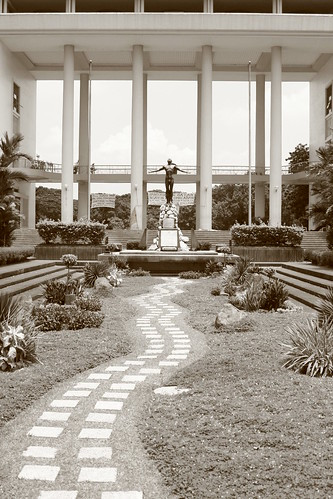
THE LIBERTY PRAYER OF 1931 AND THE NATIONAL PRAYER OF 1932
In observance of Philippine Independence Day (June 12), allow me to take you some decades back - 1931 and 1932 to be exact. A time when the words "emancipation," "freedom" and "liberty" were in every Filipino's heart. Today, not much has changed, and we still cry out for emancipation, freedom and liberty not from a foreign master any more, but from domestic tyrants who continue to enslave our nation with its lies, corruption and deceit. Observe, that these 2 prayers look like they were written only recently and not 7 decades ago. For the words and message are still the same words and message our countrymen cry out to God today.
The prayers were written and delivered by my Protestant grandfather, Jorge Bocobo.
In observance of Philippine Independence Day (June 12), allow me to take you some decades back - 1931 and 1932 to be exact. A time when the words "emancipation," "freedom" and "liberty" were in every Filipino's heart. Today, not much has changed, and we still cry out for emancipation, freedom and liberty not from a foreign master any more, but from domestic tyrants who continue to enslave our nation with its lies, corruption and deceit. Observe, that these 2 prayers look like they were written only recently and not 7 decades ago. For the words and message are still the same words and message our countrymen cry out to God today.
The prayers were written and delivered by my Protestant grandfather, Jorge Bocobo.
THE LIBERTY PRAYER OF 1931
O living God, our Father, may Thy grace ever abound unto our nation. In perfect trust do we seek to know Thy will in our strivings for liberation. Bless Thou every hand that toils and every heart that throbs for freedom. Grant that in the vehemence of our struggles for liberty, no ill-will or hatred may creep into our hearts. Give us to bear our disappointments with charity and long-suffering, confident that Thou, O God of deliverance, will never forsake us Thy people.
We beseech Thee to bestow increasing strength and power upon those who labor for our emancipation, and may those who deny us freedom see the righteousness of our cause.
In the hollow of Thy mighty hand are the destinies of all nations. To Thee we commend our country's future, so that, we pray Thee, it may shine unto the perfect day. We fear no harm or evil under the shadow of Thy wings. Lead our people on the paths of righteousness and of good will towards all men. Let freedom be ours, O Thou giver of every good gift. We thank Thee for manifold blessings in the past. May we be deserving of Thy continued protection today and in the years to come. To Thee we attribute all glory and all power forever and ever. Amen.
THE NATIONAL PRAYER OF 1932
Almighty God, Father of all nations, fountain of all strength and mercy, we, Thy people, come unto Thee in our hour of danger and distress. Hide not Thy face from this nation, we beseech Thee. Do Thou pour out Thy holy comfort upon our afflicted souls. We are Thy people, and Thou art our refuge and deliverer. Of Thy loving-kindness, there is no end.
We entreat Thee, O most gracious Father, stay Thou the hand that would smite our liberties. Send forth Thy Spirit unto our rulers and so touch their hearts and quicken their sense of justice, that we may in honor keep their plighted word to us. Let not the covetous designs of a few interests prevail in the councils, nor sway its noble purposes towards our country.
We pray Thee, O Lord, grant us peace to forgive those who seek to destroy our freedom.
We thank Thee, O heavenly Father, that we can thus pray to Thee. We thank Thee that Thou hast inspired us with a renewed spirit of national unity. Do Thou bless and sanctify our aspirations as a people. Guide us in our endeavours for our emancipation to the end that our every thought and deed may be accepted in Thy sight. And to Thee be all honor and glory forever and ever. Amen.
(Image from http://lylegonzalespayabyab.blogspirit.com/)




